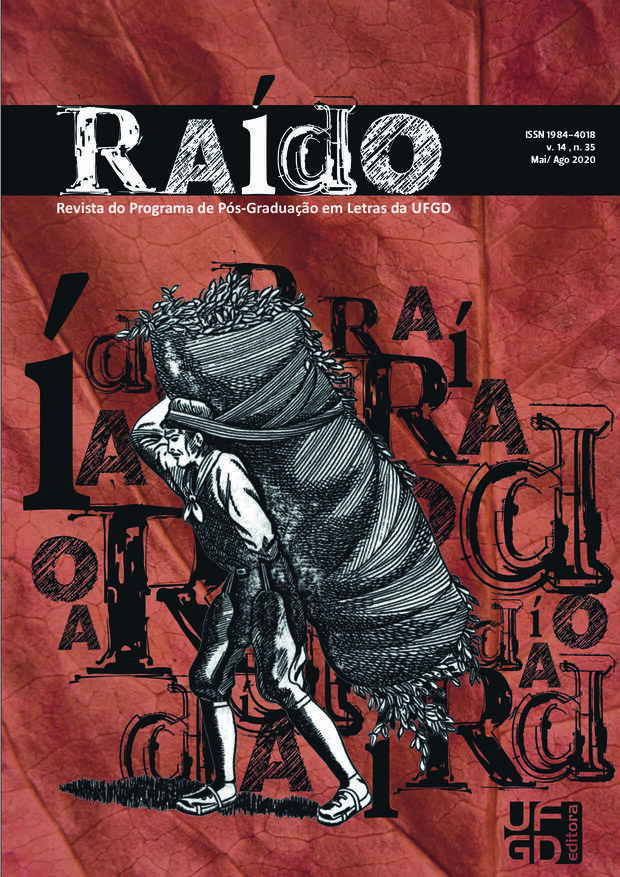The strangeness of the child before the social organization in Lygia Bojunga's A bolsa amarela.
DOI:
https://doi.org/10.30612/raido.v14i35.11912Keywords:
Child. Rationality. Coping.Abstract
The purpose of the article is to analyze the perception of the narrator of A Bolsa Amarela, the girl Rachel, about the social environment in which she lives, highlighting the child's estrangement from the habits and values of this society. Bojunga highlights, in the work, themes related to the world of childhood such as imagination, without losing sight, however, of the relationship of childhood and its phases of discovery with the conflicts generated by the authoritarian social context of the period in which the book was produced. This theme is in our interest: a closer analysis of children's rationality in comparison with the socio-historical order already established in the adult world. It is worth mentioning that, through the eyes of the narrator, the author allows a reflection on human behaviors in a society based on authoritarianism, but also enables the review of certain paradigms and prejudices for preserving autonomous and independent thinking.Downloads
References
BOJUNGA, Lygia. A bolsa Amarela. Rio de Janeiro: Agir, 1998.
CHAUÍ, Marilena. “Participando do Debate sobre Mulher e Violência”. In: Franchetto, Bruna, Cavalcanti, Maria Laura V. C. e Heilborn, Maria Luiza (org.). Perspectivas Antropológicas da Mulher 4, São Paulo, Zahar Editores, 1985.
CRISTOFANO, S. (2010). Lygia Bojunga e a Literatura Infanto-juvenil: uma Crítica Lúdica e Abordagem à Realidade Social. Linha D’Água, (23), 75-93. https://doi.org/10.11606/issn.2236-4242.v0i23p75-93
FOUCAULT, Michel. Microfísica do Poder. 24.ed. São Paulo: Edições Graal, 2007.
HEGEL G.W.F. “A Razão na História: Uma Introdução Geral à Filosofia da História”. Introdução de HARTMAN, Robert S.; Centauro Ed. SP, 2001.
ISER, Wolfgang (2002). O jogo do texto. In: COSTA LIMA, Luiz. A literatura e o leitor; textos de estética da recepção. Rio de Janeiro, Paz e Terra.
MARX, Karl. O Capital. Vol. 2. 3ª edição, São Paulo, Nova Cultural, 1988.
NAVARRO, M.A. Ruptura e renovação em A bolsa amarela, de Lygia Bojunga Nunes. In: II Congresso de Letras do CES/JF, 2008, Juiz de Fora. Caderno de Resumos do II Congresso de Letras do CES/JF. Juiz de Fora: CES/JF, 2008. v. 01.
RIOS, Dermival Ribeiro. Minidicionário Escolar Língua Portuguesa. São Paulo: DCL, 2009.
SAFFIOTI, Heleieth I. B. Gênero, patriarcado, violência. São Paulo: Editora Fundação Perseu Abramo, 2004.
SANDRONI, Laura. De Lobato a Bojunga: as reinações renovadas. Rio de Janeiro: Agir, 1987
SILVA, Vera Maria Tietzmann. O mar na ficção de Lygia. In: ________. Seis autores, seis estudos. Goiânia: Ed. UFG, 1995.
VASCONCELOS, Maria Luiza Bretas. Lygia Bojunga Nunes em três tempos: o processo de sua criação. 2001. Dissertação (Mestrado em Literatura) – Universidade Federal de Goiás, Goiânia, 2001.
YUNES, Eliana. Lygia Bojunga ou uma Literatura em processo: uma entrevista com Eliana Yunes. Proleitura, Unesp/UEM/UEL, ano 3, n.9, fev. 1996.
ZILBERMAN, Regina; MAGALHÃES, Ligia Cademartori. Literatura Infantil: autoritarismo e emancipação. 3. ed. São Paulo: Ática, 1987.
Downloads
Published
How to Cite
Issue
Section
License
Os autores devem aceitar as normas de publicação ao submeterem a revista, bem como, concordam com os seguintes termos:
(a) O Conselho Editorial se reserva ao direito de efetuar, nos originais, alterações da Língua portuguesa para se manter o padrão culto da língua, respeitando, porém, o estilo dos autores.
(b) Autores mantém os direitos autorais e concedem à revista o direito de primeira publicação, com o trabalho simultaneamente licenciado sob a Atribuição-NãoComercial-CompartilhaIgual 3.0 Brasil (CC BY-NC-SA 3.0 BR) que permite: Compartilhar — copiar e redistribuir o material em qualquer suporte ou formato e Adaptar — remixar, transformar, e criar a partir do material. A CC BY-NC-SA 3.0 BR considera os termos seguintes:
- Atribuição — Você deve dar o crédito apropriado, prover um link para a licença e indicar se mudanças foram feitas. Você deve fazê-lo em qualquer circunstância razoável, mas de nenhuma maneira que sugira que o licenciante apoia você ou o seu uso.
- NãoComercial — Você não pode usar o material para fins comerciais.
- CompartilhaIgual — Se você remixar, transformar, ou criar a partir do material, tem de distribuir as suas contribuições sob a mesma licença que o original.
- Sem restrições adicionais — Você não pode aplicar termos jurídicos ou medidas de caráter tecnológico que restrinjam legalmente outros de fazerem algo que a licença permita.



